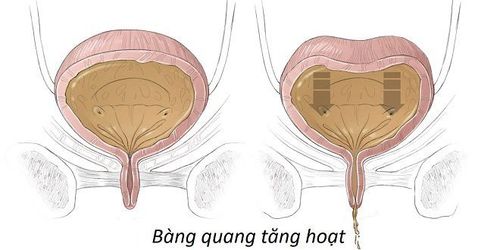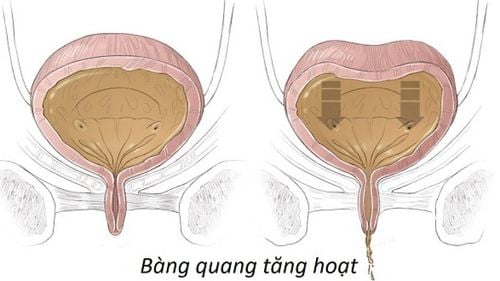This is an automatically translated article.
Overactive bladder is a common medical condition that can cause urinary disorders and affect daily life. Meanwhile, women are subject to a higher incidence, especially during menopause.1. What is an overactive bladder?
Overactive bladder syndrome is a common condition that occurs when the bladder has sudden, uncontrolled contractions and when the bladder does not fill with urine. Symptoms include:Urgency: The patient is stimulated to urinate despite wanting or not Urinating often: Urinating more than 7 times/day Nocturia: Urinating many times at night Urinating incontinence: Water Urinary leakage before the patient goes to the toilet when there is a feeling of urgency. The cause of overactive bladder syndrome is currently unknown. In the normal person, the bladder muscle relaxes as it fills with urine and contracts, causing the urge to urinate. However, in people with overactive bladder, the bladder contracts too soon when it is not full, the bladder muscles send incorrect information to the brain, leading to a sudden feeling of needing to go to the toilet.

Hội chứng bàng quang tăng hoạt là một bệnh thường gặp, xảy ra khi bàng quang có sự co thắt đột ngột mà không có sự kiểm soát và khi bàng quang không chứa đầy nước tiểu
2. How does menopause affect an overactive bladder?
Menopause is counted from the last menstrual period and no period for 12 months thereafter. During menopause, a woman's body undergoes many changes in both hormone levels. Estrogen is important for fertility and sexual desire, and it also affects the health of organs and tissues, skeletal muscles, and the urinary tract. When estrogen levels decrease, the risk of overactive bladder syndrome increases. Therefore, women in menopause have a higher incidence of urinary disorders.In addition, hormonal changes also increase the risk of urinary tract infections. People with urinary tract infections may experience symptoms similar to overactive bladder syndrome. Besides, pregnancy and childbirth is also a stage in life that affects the bladder. This physiological process weakens the pelvic floor and the ligaments that support the bladder, especially in vaginal births.

Mang thai và sinh con cũng là một giai đoạn trong cuộc sống có ảnh hưởng đến bàng quang
Gynecological examination Gynecological examination, breast examination Transabdominal ultrasound of uterus and ovaries Taking samples for cervical-vaginal cytology Mammogram (2 sides) Osteoporosis Measurement Perform other tests to detect premenopausal conditions, if any.
Please dial HOTLINE for more information or register for an appointment HERE. Download MyVinmec app to make appointments faster and to manage your bookings easily.













